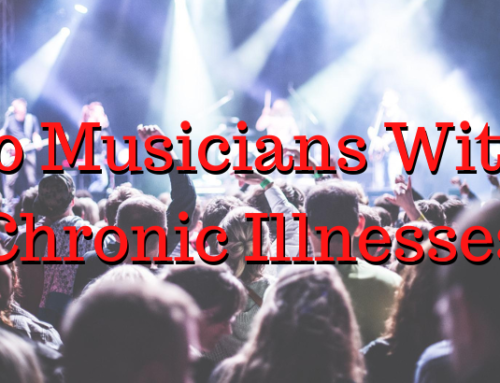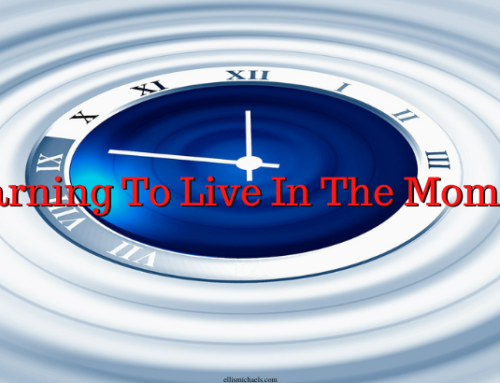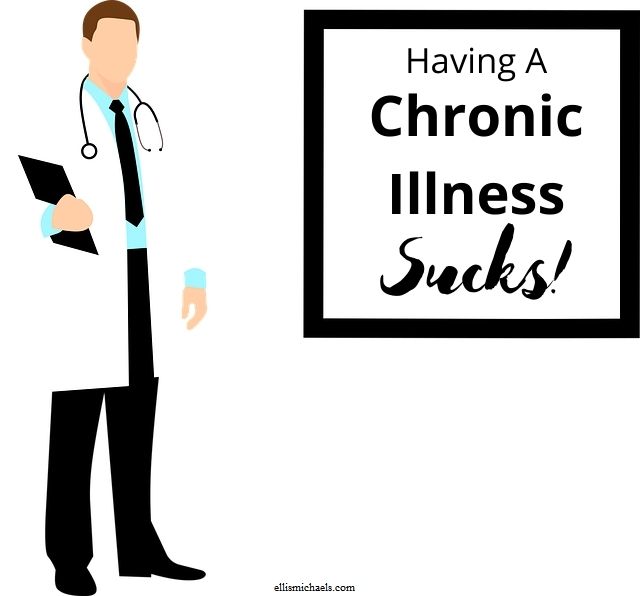You feel alone. You feel like you’re the only person dealing with [insert diagnosis or problem here].
Well, I’ve got some good news for you. You’re not alone.
You might feel like the only person on the planet dealing with your diagnosis or other issue. However, I promise you, you’re not.
So read on. Hopefully by the end of this article you’ll realize that you’re not the only one who feels the way you do.
Why I used to feel alone
Table of Contents
Everybody has things about themselves that they don’t like. But when we let those things affect our happiness, they become a problem.
I’ll use myself as an example. And this is just one example of many I could give. A younger version of myself would have been ashamed to tell you what I’m about to. But not anymore. I refuse to let being self-conscious control me anymore.
When I was a teenager, I was diagnosed with Behcet’s disease. It’s a rare autoimmune disease that causes inflammation in the blood vessels all throughout my body. Behcet’s is so rare in the United States that many doctors have never heard of it. I felt so terribly alone.
All throughout my teens and 20’s, I felt different than everyone else. I thought everyone had perfect health – everyone except me.
I didn’t tell anyone about my illness. Not my close friends. Not even my girlfriends. I went to great lengths to hide it from everyone.
I was always self-conscious and constantly afraid of embarrassment. This illness caused me to have scars on my skin, problems with my teeth, swollen limbs, and other things that I was embarrassed about.
![]() I was always afraid of people noticing these things. But the funny thing is, no one ever did.
I was always afraid of people noticing these things. But the funny thing is, no one ever did.
You see, I now realize a few things. First of all, as rare as my particular illness is, there are tons of people with similar illnesses.
In fact, it’s estimated that about 50 million people in the United States have an autoimmune disease.1 That’s almost one in six!
Second, I was overly self-conscious about myself. The things I was constantly afraid of people noticing (scars, teeth, swollen legs, etc.) weren’t as bad as I made them out to be in my head.
My scars are barely noticeable to anyone but me, you can’t see anything wrong with my teeth unless you look into my mouth closely with a flashlight, and the only people who have really noticed my swollen limbs were my doctors and myself.
And the last thing I now realize is this: Most people don’t give a shit about the things that I was self-conscious about. They’re too busy worrying about their own problems to be worrying about mine.
It’s true. I was afraid of being judged by others. But now I realize that it was me who was being judgmental. I was judging everyone else.
See, by expecting people to judge me, I was actually prejudging them. I assumed other people would react in a particular way if they noticed certain things about me.
I now see that people (in reality) aren’t the mean, judgmental assholes that I thought they were (in my head). Everyone is dealing with their own problems. They are too busy being self-conscious about themselves to be judging anyone else.
Keep in mind, though, that I’m a 40-year-old man who treats everyone I meet with kindness and respect. And I generally get kindness and respect back in return.
![]() But if you’re a 16-year-old asshole (like I was) who’s still in high school, yeah, you’re gonna get judged. That’s why it’s so important to surround yourself with positive people, if you can.
But if you’re a 16-year-old asshole (like I was) who’s still in high school, yeah, you’re gonna get judged. That’s why it’s so important to surround yourself with positive people, if you can.
Anyway, the point of all this is that I know what it’s like to feel alone. It sucks. You feel like you’re the only one on the planet that feels the way you do. You feel like no one would ever accept you. You feel like you constantly have to be on your guard around people. Again, it sucks.
But you don’t have to feel that way anymore. I don’t. And I never will again. I’ve learned to accept the things about myself that once prevented me from living the life I wanted to.
And now I’m gonna show you how to do it, in two steps. First, you need to understand that you’re not alone. Second, you need to connect with others like you. I’m gonna show you how to do both.
You’re not special
It’s true. You’re not special.
 Not in the way you think you are. You may feel alone and like you’re the only one dealing with certain issues. But I promise you, you’re not. Let’s look at some numbers.
Not in the way you think you are. You may feel alone and like you’re the only one dealing with certain issues. But I promise you, you’re not. Let’s look at some numbers.
There are approximately 7.6 billion people on the planet.2 Think about that for a second. Seven. Billion. That’s a huge number.
Of that 7 billion, approximately 330 million people live in the United States. That’s still a shitload of people (Shitload is a valid unit of measurement. Google it.).
Do you think you’re so different that, out of 330 million people, no one is going through what you are? Not likely.
Whatever your diagnosis, whatever the reason(s) you feel alone, there’s probably tons of other people going through the same thing. And the funny thing is, many of them probably feel alone, too. Let’s look at a few reasons why people feel alone and self-conscious.
Maybe you feel alone because you’re taking medication. Well, guess what? So is 70 percent of the population.3 Or maybe you feel alone because you’re taking psychiatric medication. Well, you’re in good company, because so are close to 70 million other Americans.4
Think about that for a second: 70 million out of 330 million. That’s around 20% of the population. So if you’re sitting in a room with 20 people in it, chances are at least 4 of them are on psych meds. Still feel alone?
Maybe it’s not medication that you’re self-conscious about. Maybe it’s self-harm. Maybe you cut yourself and you feel isolated and alone.
Well, you’re not alone. Over 800-million people go to the hospital every year for self-inflicted injuries.5 But that’s just people who go to the hospital. The actual number of people that cut themselves is much, much higher.
It’s estimated that between 13-23% of teenagers cut themselves.6 If you’re a teen who cuts and you feel alone because of it, think about that. If there are 30 kids in your class, odds are at least 5 others cut themselves. And it’s very likely they feel just as alone as you.
Maybe you feel alone because you have severe anxiety. Well, guess what? So does 18% of the population.7 If you’re walking through the mall, approximately 1 out of every 5 people that you walk past has some type of anxiety disorder.
Or maybe you’re depressed. Major depression affects about 16 million adults every year.8 That’s almost 7 percent of the adult population. With teens, that number is much higher. About 1 in 8 teens meet the criteria for major depression.
 If you’re a teen suffering from depression, think about that the next time you’re sitting in class. As depressing as math class already is, maybe it’ll make you feel a little better to know you’re not the only one who’s unhappy. If there are 25 students in your class, chances are at least a couple others are also severely depressed.
If you’re a teen suffering from depression, think about that the next time you’re sitting in class. As depressing as math class already is, maybe it’ll make you feel a little better to know you’re not the only one who’s unhappy. If there are 25 students in your class, chances are at least a couple others are also severely depressed.
Maybe it’s your teeth that you’re self-conscious about. Over 8% of adults age 20-64 have periodontal disease.9 And over 5% have moderate-to-severe periodontal disease. So if you’re in a restaurant with 100 people in it, odds are there are 7 or 8 others with dental problems.
Are you starting to get my point? These are just a few examples. No matter what it is that makes you feel self-conscious and alone, there are plenty of other people out there dealing with the same thing.
And most of them probably feel the same way that you do.
Hopefully you’re starting to think that you aren’t so alone after all. Now I’m gonna tell you what you can do so you don’t feel so alone.
Connect with others
Before the internet came along, it was hard to connect with other people dealing with similar personal issues (Yes, there was a world before the internet. I know this because I looked it up on the internet).
Sure, there were support groups. And you could go to group therapy. But what if you’re feeling alone in the middle of the night? What if there’s no support group for what’s making you feel alone?
 With the internet, these are problems of the past. No matter what it is that makes you feel alone, there’s some kind of website, group, forum, or chat room dedicated to it. There’s a lot of cool shit on the internet. Check it out sometime.
With the internet, these are problems of the past. No matter what it is that makes you feel alone, there’s some kind of website, group, forum, or chat room dedicated to it. There’s a lot of cool shit on the internet. Check it out sometime.
I’m reminded of the funny but accurate saying, “If it exists, there’s porn of it.” If you’re not familiar with that saying, it’s Internet Rule #34. Funny stuff.
But I bring that up because there’s another rule of the internet. If there’s something that makes you feel self-conscious and alone, there’s some kind of group for it.
There are groups dedicated to anything you can think of. Depression and anxiety groups. Self-harm and suicide groups. Groups for people who like to use drugs. Groups for people trying to get off drugs. Groups for shy people. Groups exclusively for attractive people. Groups exclusively for ugly people. STD groups. Pansexual groups. Groups for people who can’t stop naming groups.
Okay, I made that last one up (though I wouldn’t be surprised if was a thing). But all the others are real. There are groups for everything. There are even groups for people who like to dress up as animals (furries). Even for adult men who are obsessed with My Little Pony (bronies)!
Now, I’m not judging. I’m just making the point that, no matter how weird or unusual you think you might be, there are plenty of others out there just as weird. And weird in all the same ways.
Go find them, and join them.
If it’s others with chronic illnesses you’re looking for, you may want to read this. Where To Meet Others With Chronic Illnesses.
You are special
You’re not the only person who feels alone. And you’re not the only one dealing with the issues that you’re dealing with.
 But you are the only you. You’re the only one who has the collection of life experiences that you do. You are the only person on the planet who has seen the world through your eyes.
But you are the only you. You’re the only one who has the collection of life experiences that you do. You are the only person on the planet who has seen the world through your eyes.
So get out there and share your unique perspective with others. Find others who have the same issues as you on the internet and in real life. Learn from them and share with them.
One of the best ways to deal with something that you’re going through is to help others going through the same thing. This is the whole point of support groups.
Help others with the same issues as you by sharing your unique experiences with them. It’ll help them feel less alone. And it will do the same for you.
Conclusion
Whatever troubles you, you are not alone.
 I’ve learned to overcome the insecurities that once prevented me from living the life that I wanted to. I hope that, by sharing this all with you, you’ll be able to do the same.
I’ve learned to overcome the insecurities that once prevented me from living the life that I wanted to. I hope that, by sharing this all with you, you’ll be able to do the same.
Don’t be afraid to reach out and to open up. People can be very understanding, but you have to open up to them. Remember, everyone has gone through something that made them feel alone at one point.
Do you feel alone? Do you feel like you’re the only one going through something? Or have you overcome feeling self-conscious and alone about something?
I’ve told you about some of my experiences overcoming the terrible feelings of loneliness and self-consciousness. Now I’d love to hear from you. Please leave your responses in the comments section at the bottom.
Join the Ellis Michaels mailing list to stay up to date with the latest news about chronic illnesses, recent articles and other publications, and more.
References
1Rare autoimmune diseases: individually rare, collectively common. (1999). American Autoimmune Related Diseases Association, Inc. Retrieved August 29, 2020 from https://www.aarda.org/rare-autoimmune-diseases-individually-rare-collectively-common/
22020 world population by country. (n.d.). World Population Review. Retrieved August 29, 2020 from https://worldpopulationreview.com/
3Zhong, W., Maradit-Kremers, H., St. Sauver, J., McGree, M., et al. (2013). Age and sex patterns of drug prescribing in a defined American population. Mayo Clinic Proceedings, 88(7):697-707.
4Miller, S. (2016, Dec. 13). 1 in 6 Americans take a psychiatric drug: Antidepressants were most common, followed by anxiety relievers and antipsychotics. Scientific American. Retrieved August 29, 2020 from https://www.scientificamerican.com/article/1-in-6-americans-takes-a-psychiatric-drug/
5WISQARS Nonfatal. (2018). Centers for Disease Control and Prevention. Retrieved August 29, 2020 from https://wisqars-viz.cdc.gov:8006/non-fatal/home
6Peterson, J., Freedenthal, S., Sheldon, C., & Andersen, R. (2008). Nonsuicidal self injury in adolescents. Psychiatry, 5(11):20-6.
7Facts and statistics. (n.d.). Anxiety and Depression Association of America. Retrieved August 29, 2020 from https://adaa.org/about-adaa/press-room/facts-statistics#:~:text=Anxiety%20disorders%20are%20the%20most,of%20those%20suffering%20receive%20treatment.
8Depression. (n.d.). Anxiety and Depression Association of America. Retrieved August 29, 2020 from https://adaa.org/understanding-anxiety/depression
9Periodontal disease in adults (age 20 to 64). (2018, July). National Institute of Dental and Craniofacial Research. https://www.nidcr.nih.gov/research/data-statistics/periodontal-disease/adults#:~:text=8.52%25%20of%20adults%20age%2020,likely%20to%20have%20periodontal%20disease.







Leave a Reply